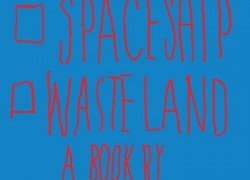
Darth Vader is a zombie. Think about it. He carries all the requisite features: the blind hatred of all those around him, the soulless disposition which allows him to carelessly destroy human (and alien) life, and of course, the pale, pustule-filled skin. Now, although Darth Vader may not seem like the most accurate zombie candidate, this comparison could not be more adroit for Patton Oswalt. In his debut novel, “Zombie Spaceship Wasteland,” the stand-up comedian and KFC Famous Bowl-hating enthusiast exercises both humor and poignancy on his early comedy days and the adolescent influences that drove him there.
Beginning in the 1980s, as a “suburban feudal subject” in Sterling, Virginia, Oswalt’s book throws you into his world as an employee at the local cineplex with equal parts absurdity, fascination, and regret. For him, it was a transformative experience where popcorn was buttered, assistant managers smelled of “corpse fart” and terrible movies graced the silver screen. An idyllic life to be sure. Framed by the lyrics of R.E.M.’s Fables of the Reconstruction, the teenage tale of small-town shenanigans and southern life culminates at the moment when Oswalt’s cultural awakening took place – in an underground theater, listening to Michael Stipe as “Adventures in Babysitting” played in the background.
Like the opening essay, Oswalt’s book contains a manic combination of references which serve to match the equally crazed mind that wrote it. It’s a memoir-comedy hybrid that stretches the gamut of genres from childhood whimsy to vampire comics to an epic poem about his childhood D&D character, Ulvaak. As Oswalt’s fantasy warrior, Ulvaak can “wade through blood and gore/claim a treasure” and “bed a whore.” He’s a jack of all trades and more to the point, so is his creator. Not only is Oswalt able to pen a poem which reads like the mental melding of Jonathan Swift and Gary Gygax, but he is also able to transcend these literary styles without hesitation.
One moment we’re given a dazzling set of faux greeting cards and the next, we are introduced to the bygone era of hobo songs (my favorite being “Squirrel House Christmas”). The seemingly random collection can be initially jarring, but ultimately rewarding due to its rich sense of creative flair and acerbic observation. Oswalt, after all, is a comedian and observation is what he does best.
Like his fellow Gen X-er Chuck Klosterman, Oswalt critiques and analyzes the culture he lives in with – one made up of three subgroups: zombies (those who simplify), spaceships (those who leave) and wastelands (those who destroy). It’s an incisive and personal dissection of the world he grew up in where the zombies, spaceships and wastelands of the films “Star Wars” and “The Road Warrior” became inextricably linked to the people who watched them – the fans.
More than just for fans, it’s a book for the nerds and the geeks – the products of Oswalt’s generation – who experience their lives through an intimate connection with pop culture. In fact, the progress of Oswalt’s comedy career – recounted in the thoroughly riveting “A History of America from 1988 to 1996″– can be tied to the rise of the nerd, from fringe loner to mainstream winner proving only one thing: This is the age of Oswalt. It is an era where, now that everything is available at one’s fingertips, the exclusivity of an album like Fables of the Reconstruction becomes moot once it’s available on iTunes. For Oswalt, this broadened accessibility is exciting and often humorous, but also somewhat troubling.
In the YouTube generation, this immediacy to music videos, films, and internet memes can produce a certain type of attention deficiency. Look to the end of Oswalt’s chapters where he lists the items which distracted him during his own writing process. It’s perhaps a trivial detail, but one which captures the wry, imaginative and frequently honest scribblings of this possibly mad man to a tee. More than just lists of Wikipedia articles and Google searches, they are, like Oswalt’s book, an account of the specific references and cultural connections which have affixed themselves as much to our identities as Darth Vader’s helmet has to his pasty head.
